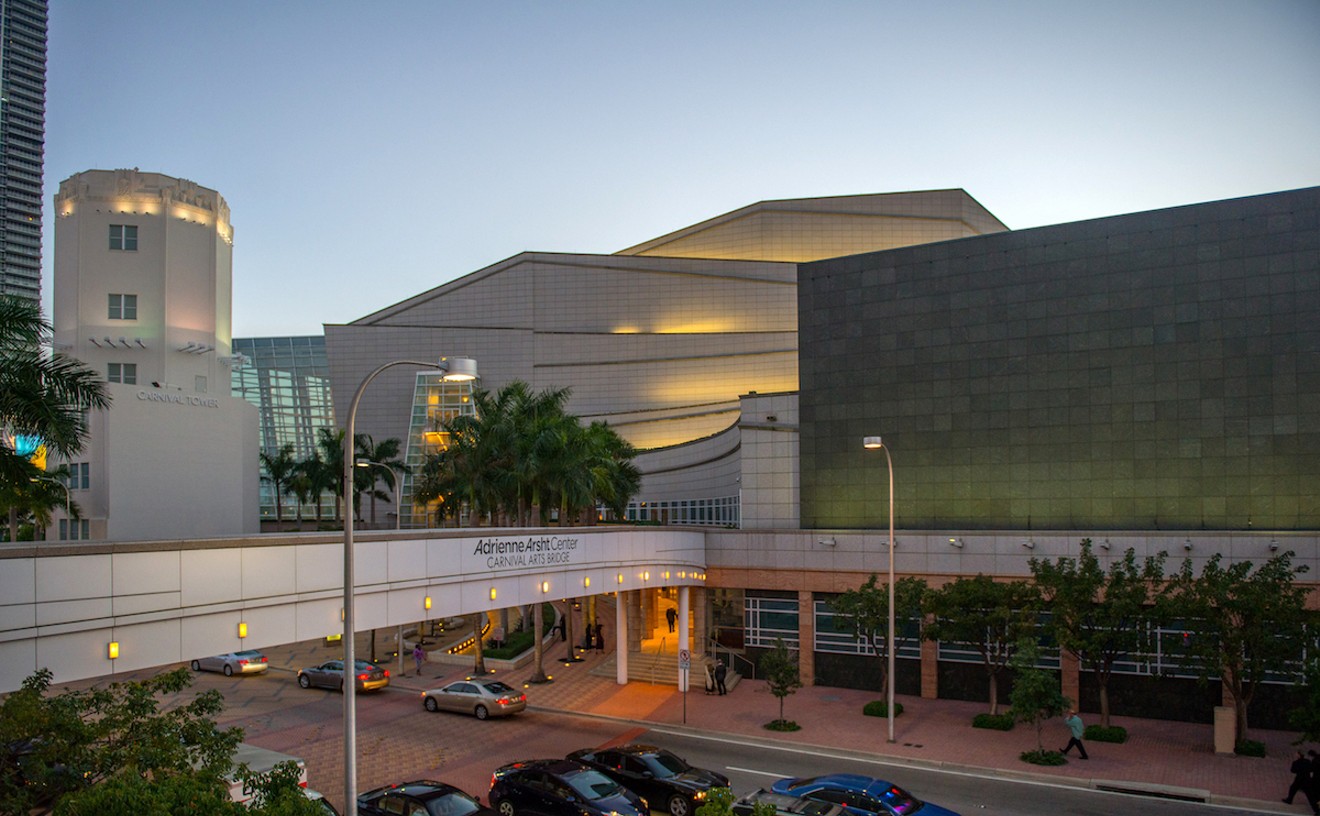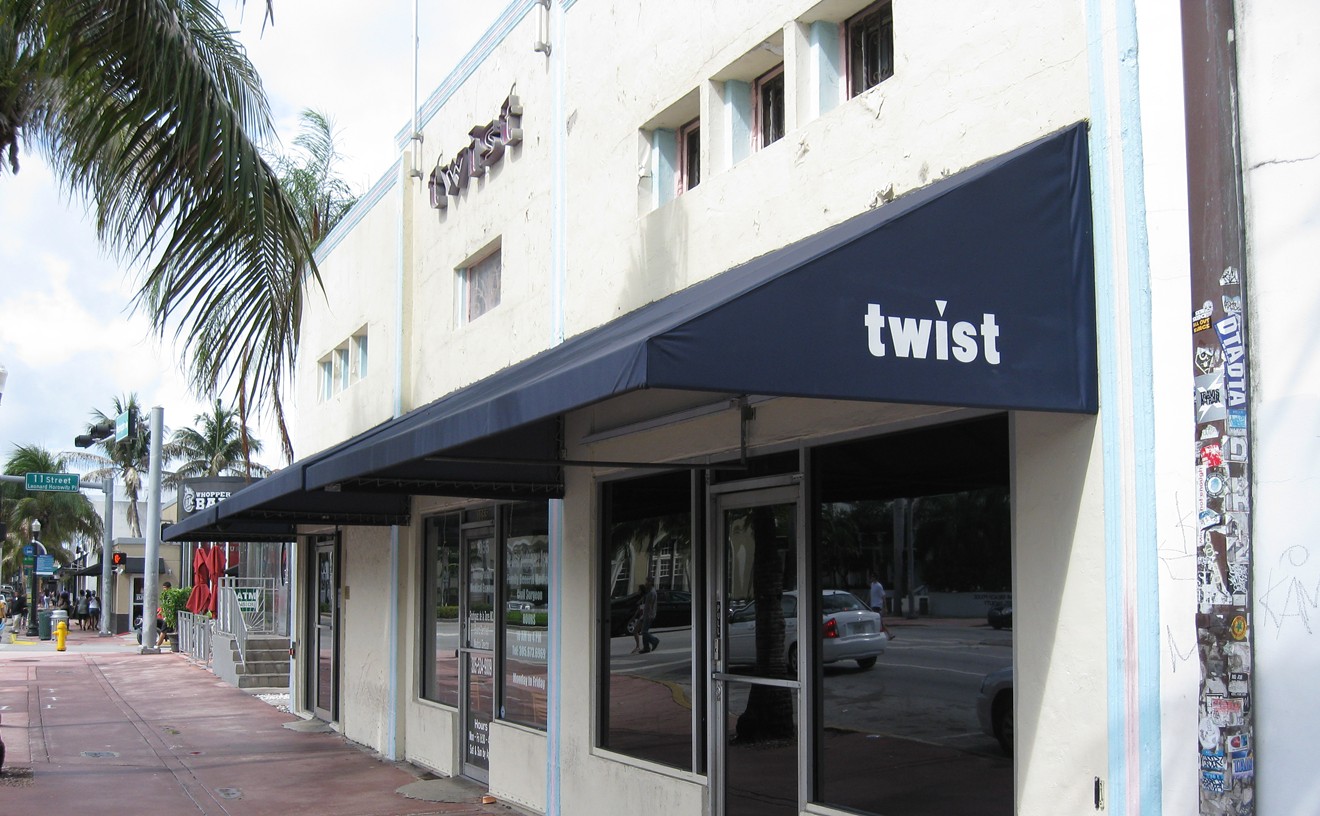The touring production of Elf didn't make its way to Miami until December 31 — after many Christmas enthusiasts had already pulled the lights off their palm trees and bundled away the inflatable lawn snow globes for another year. But that doesn't mean the Christmas spirit didn't live strong at the Adrienne Arsht Center for the Performing Arts. In fact, when it comes to eternal holiday cheer, Elf probably gave the year-round local favorite Christmas Palace a run for its money. The production, based on the instant classic starring Will Ferrell and Zooey Deschanel, brings the film to even grander and sillier heights by not only keeping all the fan favorite lines and scenes but also adding infectious songs, even more heart, and so much holiday fun that Santa might OD on cheer. Even better, Elf delivered snow to Miami, dusting the stage with the kind of white stuff that's all too rare in the 305. By the musical's end, you'd be hard-pressed not to agree with Buddy the Elf when he proclaims, "Smiling's my favorite!"
Best Actor
Nicholas Richberg

It's worth remembering that before John Wilkes Booth became the first successful presidential assassin, he was a Shakespearean actor, and apparently a damn good one. Early reviews of his plays referred to his "natural genius" and his status as "the most promising young actor on the American stage." So it takes an equally brilliant actor to bring this fascinating monster to life, to convey both his misguided sense of vengeance and his imposing theatricality — his demons and his dramaturgy alike. In this regard, Nicholas Richberg exceeded all expectations in his embodiment of Booth, one of a number of presidential killers explored in Stephen Sondheim's offbeat musical Assassins, from Zoetic Stage. Resembling the real Booth with frightening attention to detail in hair, makeup, and costuming, Richberg anchored a show that is, by its nature, all over the place — providing, in the character of this talented racist, its panache and its fire and even its soul. Barbara Bradshaw, a former New Times Best Actress winner, recently told a reporter that even if she were playing the biggest villain in a show, she needed to play her with the knowledge that she didn't know she was a villain. This was certainly the case with Richberg's Booth, who achieved the unlikely feat of making us genuinely care about the man who murdered our greatest president.
- 1300 Biscayne Blvd., Miami, 33132 Map
- 305-949-6722
- arshtcenter.org
Best Supporting Actor
Ethan Henry

Most critics agreed that Metamorphoses — the Adrienne Arsht Center and University of Miami Theater Department's ambitious adaptation of Mary Zimmerman's version of Ovid's Roman myths — was not a great success. But the effect of its uneven pacing and wildly disparate cast of students and professionals ensured that one performance stood out all the more glaringly from the rest, for all the right reasons. Ethan Henry almost single-handedly brought the cerebral script and ancient source material to vivid life, inhabiting its most difficult and iconic characters. His interpretation of Midas as an arrogant one-percenter who learns humility the hard way was powerful enough, but nothing could prepare audiences for his role in the Cinyras myth, in which his lecherous character engaged in a blindfolded sexual tryst with a nubile girl who turned out to be his daughter. The incestuous liaison took place in a pool, with Henry and Alanna Saunders swirling and tumbling on the water's surface in shameful ecstasy. The moment when the blindfold came off, and Henry's carnal bliss metamorphosed into the agony of irredeemable despair, was as masterful a transition from one extreme to another as any that graced a stage in recent memory. Let's hope the UM students populating at least half of this production were taking copious mental notes.
- 1300 Biscayne Blvd., Miami, 33132 Map
- 305-949-6722
- arshtcenter.org
Best Director
Tarell Alvin McCraney

A lot of theater companies and movie producers do the whole "Shakespeare as you've never seen him before" thing, which usually involves staging the Bard's words inside a McDonald's, on the front lines of a Middle Eastern war, or in outer space. But Miami native Tarell Alvin McCraney's eccentric and visionary adaptation of Antony and Cleopatra never relied on such gimmicks. It employed the abstract sets and spartan style of his previous work at GableStage (like The Brothers Size and his ratatat Hamlet) to somehow evoke both 18th-century Haiti and ancient Rome/Alexandria, creating a cross-cultural hybrid that respected the original source material while enriching it with subtextual meaning. The props and live, balcony-perched band created Afro-Caribbean ambiance that drifted in and out of Shakespeare's fraught and complicated text, uttered by its spectacular cast with the mix of frothing passion and enviable, roll-off-the-tongue nonchalance that any modern Shakespeare interpretation could hope for. Yes, not every actor enunciated clearly enough for every line to be heard within the Colony Theatre's imperfect acoustics, but be honest: Unless you're a Shakespeare scholar, you wouldn't be able to decipher it all anyway. The grandiosity and chutzpah of this cinematic vision more than made up for any minutiae that might have slipped through the cracks.
- 1040 Lincoln Rd., Miami Beach, 33139 Map
- 305-674-1040
- miaminewdrama.org/about/the-colony-theatre/
Best Set Design
Assassins

Michael McKeever's set for Zoetic Stage's Assassins must have been a fun place to show up to work for its cast of ten. After all, it's not often you get to spend a couple of hours a night playing around and firing blanks into a multitiered carnival booth, not to mention exhaling your last breath while collapsing onto a flawless replica of the official presidential seal of the United States. With its mix of jingoistic colors and iconography and its peeling wooden marquee reading "Take Your Shot," McKeever's set resembled both Coney Island parlor games and White House pomp and circumstance — finding a visual representation of the nexus of the assassins' low-rent delusions and their unseen victims' patriotic grandeur. It was also a fount of hidden pleasures, from the centrally positioned, rotating presidential portrait to the red-and-blue police sirens tucked away in crates to the noose atop the stairway, which helped create one of the show's funniest visual gags. This might sound like a dubious honor for McKeever, but the fact is, if anyone had the choice to die on any set, it would be this one.
- 1300 Biscayne Blvd., Miami, 33132 Map
- 305-949-6722
- arshtcenter.org
Best Play
End of the Rainbow

The Actors' Playhouse's End of the Rainbow was a funny and heartbreaking antidote to the stale formula of the Judy Garland musical revue. Moreover, it satisfied criteria for both best play and best musical of the year, encompassing the crackling dramatic exigencies of the former and the seemingly unpredictable cabaret atmosphere of the latter. Mostly, though, it was a bold look at faded glory — that of Garland, once the biggest star in the world, reduced at the end of her truncated life to insecure pill fiend, alcoholic, rotten friend, and erratic, occasional nightclub singer, when she wasn't too doped up to put one foot in front of the other. The perfectly diminutive Kathy St. George captured Garland's charms as well as her demons, and Colin McPhillamy exuded initial warmth and finally tragic pathos as her longtime pianist, a loving man ultimately crushed by the oblivious Garland steamroller. Director David Arisco handled the shifting genres with ease, especially the play's transitions from hotel room to nightclub — complete with a live onstage band — which never ceased to dazzle.
- 280 Miracle Mile, Coral Gables, 33134 Map
- 305-444-9293
- actorsplayhouse.org
Best Theater Company
Zoetic Stage

Zoetic Stage has been producing fine work since its inception in 2010, but this past season was the one in which the company really came into its own, establishing itself as a powerhouse incubator of new plays and an accomplished interpreter of canonical classics. The antiwar dramedy Fear Up Harsh opened the season with a proverbial mortar blast of energy, wit, and insight, earning a pair of Carbonell Awards in its wake, including Best New Work for playwright Christopher Demos-Brown. Its followup, Assassins, likewise plumbed comedy from dark scenarios. A standout cast, a spare-no-expense set design, and dynamite costumes brought to life the black humor, complex musicality, and blistering monologues of one of Stephen Sondheim's most controversial musicals. The season continued with one of Michael McKeever's finest comedies, Clark Gable Slept Here, a world-premiere satire about Hollywood that explored the movie industry's myth-making at the expense of its humanity — if such a thing can exist in the plastic Dream Factory. Producing only four shows in its season (The Great God Pan opened after this writing), compared with other companies' five or six, Zoetic had fewer chances to stumble, but the flawlessness of its track record remains impressive and sets an intimidating bar for next year.
- 1300 Biscayne Blvd., Miami, 33132 Map
- 305-949-6722
- arshtcenter.org
Best New Play
Fear Up Harsh

Few works, new or established, were as instantly visionary as Christopher Demos-Brown's Fear Up Harsh. The play, which premiered in an acclaimed production at Zoetic Stage, opened on a delirious gamble, in which the carnage of a war zone played in complete blackness, its actions bleeding into the next scene in a traumatic, time-shifting cacophony. The effect was dizzying and whiplash-inducing but never less than compelling, and it set the stage for a Brechtian exercise in the lingering effects of war (and awards) that deservedly won the Best New Work statuette at the 2013 Carbonell Awards. The hierarchies of rank, the politics of medals, the shameful horror of "enhanced interrogation techniques," and the struggles of being a single dad who is also a wheelchair-bound veteran coalesced into a 21st-century American tragedy that was also, when it wanted to be, one of the funniest plays of the year. Demos-Brown's knack for finding believably comic conversational nooks within a more damning, bigger picture cannot be understated; though, as he has said, some of the play's best lines developed from working out the production organically with his cast. Whatever the formula, it played out magnificently on the Arsht Center stage.
- 1300 Biscayne Blvd., Miami, 33132 Map
- 305-949-6722
- arshtcenter.org
Best Comedian
John Wynn

John Wynn grew up in Texas, where his brown skin and dark locks led many to mistake him for a Mexican. When he moved to Miami a few years ago, people suddenly decided he was Peruvian. He's actually Vietnamese, but lucky for us, all those years of racial profiling have provided him with a lifetime of laugh-out-loud situations to recount. In 2012, Wynn debuted his comedic web series, Labor Days, which features South Florida's most hilarious funnymen (Daniel Reskin, Lisa Carrao, Orlando Leyba, and others); its premise: Wynn (who plays himself) is mistaken for a Mexican day laborer in a Home Depot parking lot and, after losing his job, is desperate for below-minimum-wage work. In real life, Wynn was laid off as a professor just before his wife gave birth to his now-2-year-old daughter and currently teaches cinematography and editing as an adjunct professor at three schools. Season two of Labor Days is slated to air online in August. And when Wynn isn't shuffling between work and shows, you can find him pretty consistently on the first and third Tuesday of the month at Elwoods Gastro Pub downtown for comedy night.
- 188 NE 3rd Ave., Miami, 33132 Map
- 305-358-5222
- www.elwoodsgastropub.com
Best Drag Queen
Pussila

Pussila's trademark makeup paints a pretty good picture of her onstage personality. Her distinctive eye makeup resembles the wings of a demonic butterfly. It wouldn't look out of place at a Marilyn Manson concert. Her cherry painted lips, almost always arranged in a wide smile, tell a different story. In truth she's equal parts sweet and sour. Whether onstage as MC at Twist's stripper hut or roaming the bar at Mova, she's quick to deliver a cutting remark, but it's always delivered with a laugh and a grin. Her wardrobe can be equally sassy. Sometimes she'll don a bra fashioned into two tip cups. As we all know, a drag queen's bra can never be overstuffed, so don't be afraid to tip this Colombian-born drag veteran next time you see her out.
- 1057 Washington Ave., Miami Beach, 33139 Map
- 305-538-9478
- twistsobe.com





